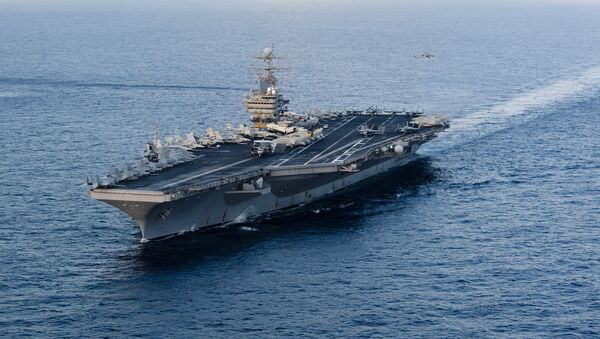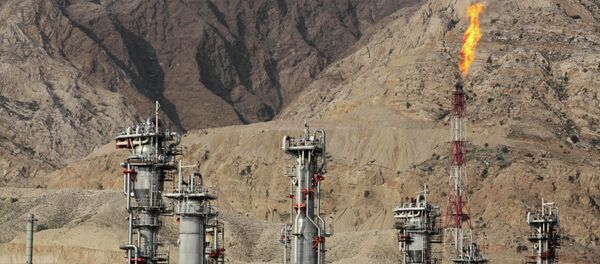Speaking to Reuters, Vice Admiral Jim Malloy, commander of the US Navy’s Bahrain-based Fifth Fleet, said that he does not rule out sending the Abraham Lincoln aircraft carrier to the strategic Strait of Hormuz despite Washington’s tensions with Iran.
“If I need to bring it inside the strait, I will do so. I’m not restricted in any way, I’m not challenged in any way, to operate her anywhere in the Middle East”, Malloy asserted.
READ MORE: Deputy Revolutionary Guard Chief Says Iran Will Not Hold Talks With US — Reports
Referring to US intelligence signalling Tehran’s alleged preparations to stage attacks against American forces, Malloy said that the intelligence was linked “with actual activity that we observed”.
The statement came as acting US Defence Secretary Patrick Shanahan ordered the deployment of the USS Arlington, a San Antonio-class amphibious transport dock and more MIM-104 Patriot missile defence systems to the US Central Command (CENTCOM), the command division covering US forces in southwest Asia and northeastern Africa.
The deployment follows National Security Adviser John Bolton’s announcement late last week that the US was deploying the USS Abraham Lincoln Carrier Strike Group and a bomber task force near Iran, in “a clear and unmistakable message to the Iranian regime that any attack on US interests or on those of our allies will be met with unrelenting force”.
He also emphasised that Washington was not “seeking war” with Iran, but that it is fully prepared “to respond to any attack, whether by proxy, the Islamic Revolutionary Guard Corps, or regular Iranian forces”.
READ MORE: US Carrier Strike Group on Route to Gulf Less Than 2,000 km From Iran – Reports
Tehran, for its part, rejected allegations that it poses a threat to the US as “fake intelligence”. Iran's Supreme National Security Council (SNSC) spokesman Keivan Khosravi described Bolton’s statement as “a clumsy use of an out-of-date event for psychological warfare”.
Iranian Foreign Minister Mohammad Javad Zarif, in turn, said that members of the Trump administration, including Bolton, were dragging Washington into a conflict with Tehran.
Separately, he said that if the US wants to enter the Strait of Hormuz, it will have to talk to the Islamic Revolutionary Guards Corps (IRGC) forces protecting it.
Earlier, the US officially blacklisted the IRGC as a foreign terrorist organisation, prodding Iran to respond in kind.
Iranian officials have repeatedly threatened to close the strategic Strait of Hormuz if the US attempts to block Iranian oil exports.
READ MORE: Ex-US Intel Officer: Iran Unlikely to Seek Nukes Despite Suspending JCPOA
As for Vice Admiral Malloy’s statement, it comes against the backdrop of growing tensions between Tehran and Washington, sparked by Trump’s decision on Wednesday to impose sanctions on Iran’s iron, steel, aluminium and copper sectors.
Rouhani warned that otherwise Tehran would resume higher uranium enrichment, stressing at the same time that Iran has no intention to withdraw from the JCPOA completely.
On 8 May 2018, Trump announced the US’ exit from the JCPOA, also reinstating anti-Iranian sanctions, including secondary measures against companies and financial institutions that do business with the Islamic Republic.



